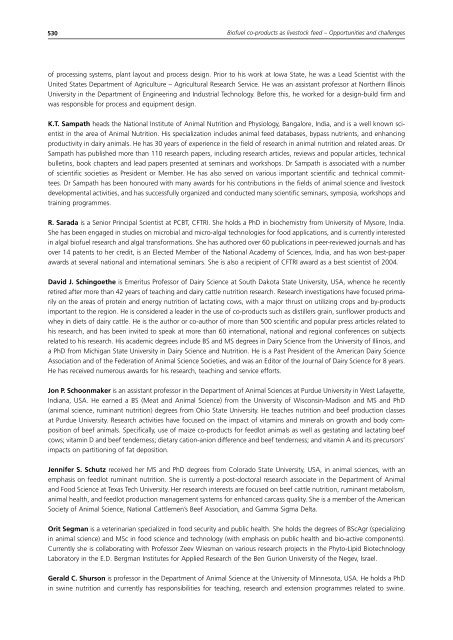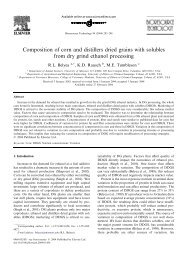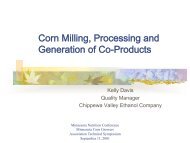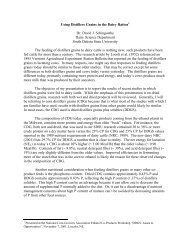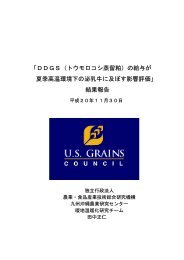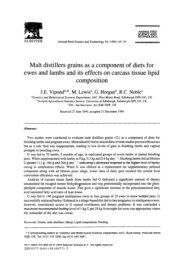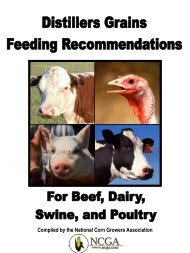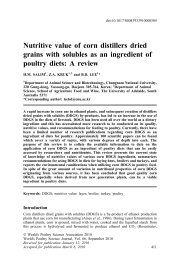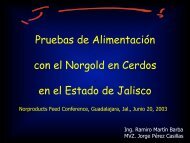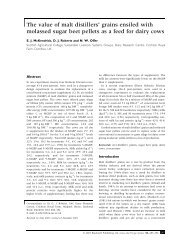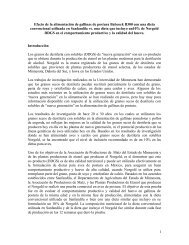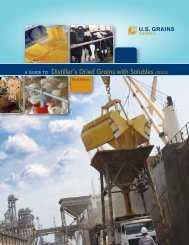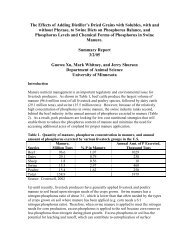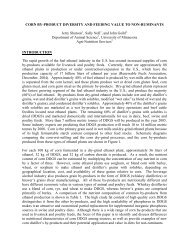Biofuel co-products as livestock feed - Opportunities and challenges
Biofuel co-products as livestock feed - Opportunities and challenges
Biofuel co-products as livestock feed - Opportunities and challenges
- No tags were found...
Create successful ePaper yourself
Turn your PDF publications into a flip-book with our unique Google optimized e-Paper software.
530<strong>Biofuel</strong> <strong>co</strong>-<strong>products</strong> <strong>as</strong> <strong>livestock</strong> <strong>feed</strong> – <strong>Opportunities</strong> <strong>and</strong> <strong>challenges</strong>of processing systems, plant layout <strong>and</strong> process design. Prior to his work at Iowa State, he w<strong>as</strong> a Lead Scientist with theUnited States Department of Agriculture – Agricultural Research Service. He w<strong>as</strong> an <strong>as</strong>sistant professor at Northern IllinoisUniversity in the Department of Engineering <strong>and</strong> Industrial Technology. Before this, he worked for a design-build firm <strong>and</strong>w<strong>as</strong> responsible for process <strong>and</strong> equipment design.K.T. Sampath heads the National Institute of Animal Nutrition <strong>and</strong> Physiology, Bangalore, India, <strong>and</strong> is a well known scientistin the area of Animal Nutrition. His specialization includes animal <strong>feed</strong> datab<strong>as</strong>es, byp<strong>as</strong>s nutrients, <strong>and</strong> enhancingproductivity in dairy animals. He h<strong>as</strong> 30 years of experience in the field of research in animal nutrition <strong>and</strong> related are<strong>as</strong>. DrSampath h<strong>as</strong> published more than 110 research papers, including research articles, reviews <strong>and</strong> popular articles, technicalbulletins, book chapters <strong>and</strong> lead papers presented at seminars <strong>and</strong> workshops. Dr Sampath is <strong>as</strong>sociated with a numberof scientific societies <strong>as</strong> President or Member. He h<strong>as</strong> also served on various important scientific <strong>and</strong> technical <strong>co</strong>mmittees.Dr Sampath h<strong>as</strong> been honoured with many awards for his <strong>co</strong>ntributions in the fields of animal science <strong>and</strong> <strong>livestock</strong>developmental activities, <strong>and</strong> h<strong>as</strong> successfully organized <strong>and</strong> <strong>co</strong>nducted many scientific seminars, symposia, workshops <strong>and</strong>training programmes.R. Sarada is a Senior Principal Scientist at PCBT, CFTRI. She holds a PhD in biochemistry from University of Mysore, India.She h<strong>as</strong> been engaged in studies on microbial <strong>and</strong> micro-algal technologies for food applications, <strong>and</strong> is currently interestedin algal biofuel research <strong>and</strong> algal transformations. She h<strong>as</strong> authored over 60 publications in peer-reviewed journals <strong>and</strong> h<strong>as</strong>over 14 patents to her credit, is an Elected Member of the National Academy of Sciences, India, <strong>and</strong> h<strong>as</strong> won best-paperawards at several national <strong>and</strong> international seminars. She is also a recipient of CFTRI award <strong>as</strong> a best scientist of 2004.David J. Schingoethe is Emeritus Professor of Dairy Science at South Dakota State University, USA, whence he recentlyretired after more than 42 years of teaching <strong>and</strong> dairy cattle nutrition research. Research investigations have focused primarilyon the are<strong>as</strong> of protein <strong>and</strong> energy nutrition of lactating <strong>co</strong>ws, with a major thrust on utilizing crops <strong>and</strong> by-<strong>products</strong>important to the region. He is <strong>co</strong>nsidered a leader in the use of <strong>co</strong>-<strong>products</strong> such <strong>as</strong> distillers grain, sunflower <strong>products</strong> <strong>and</strong>whey in diets of dairy cattle. He is the author or <strong>co</strong>-author of more than 500 scientific <strong>and</strong> popular press articles related tohis research, <strong>and</strong> h<strong>as</strong> been invited to speak at more than 60 international, national <strong>and</strong> regional <strong>co</strong>nferences on subjectsrelated to his research. His academic degrees include BS <strong>and</strong> MS degrees in Dairy Science from the University of Illinois, <strong>and</strong>a PhD from Michigan State University in Dairy Science <strong>and</strong> Nutrition. He is a P<strong>as</strong>t President of the American Dairy ScienceAssociation <strong>and</strong> of the Federation of Animal Science Societies, <strong>and</strong> w<strong>as</strong> an Editor of the Journal of Dairy Science for 8 years.He h<strong>as</strong> received numerous awards for his research, teaching <strong>and</strong> service efforts.Jon P. Schoonmaker is an <strong>as</strong>sistant professor in the Department of Animal Sciences at Purdue University in West Lafayette,Indiana, USA. He earned a BS (Meat <strong>and</strong> Animal Science) from the University of Wis<strong>co</strong>nsin-Madison <strong>and</strong> MS <strong>and</strong> PhD(animal science, ruminant nutrition) degrees from Ohio State University. He teaches nutrition <strong>and</strong> beef production cl<strong>as</strong>sesat Purdue University. Research activities have focused on the impact of vitamins <strong>and</strong> minerals on growth <strong>and</strong> body <strong>co</strong>mpositionof beef animals. Specifically, use of maize <strong>co</strong>-<strong>products</strong> for <strong>feed</strong>lot animals <strong>as</strong> well <strong>as</strong> gestating <strong>and</strong> lactating beef<strong>co</strong>ws; vitamin D <strong>and</strong> beef tenderness; dietary cation-anion difference <strong>and</strong> beef tenderness; <strong>and</strong> vitamin A <strong>and</strong> its precursors’impacts on partitioning of fat deposition.Jennifer S. Schutz received her MS <strong>and</strong> PhD degrees from Colorado State University, USA, in animal sciences, with anemph<strong>as</strong>is on <strong>feed</strong>lot ruminant nutrition. She is currently a post-doctoral research <strong>as</strong>sociate in the Department of Animal<strong>and</strong> Food Science at Tex<strong>as</strong> Tech University. Her research interests are focused on beef cattle nutrition, ruminant metabolism,animal health, <strong>and</strong> <strong>feed</strong>lot production management systems for enhanced carc<strong>as</strong>s quality. She is a member of the AmericanSociety of Animal Science, National Cattlemen’s Beef Association, <strong>and</strong> Gamma Sigma Delta.Orit Segman is a veterinarian specialized in food security <strong>and</strong> public health. She holds the degrees of BScAgr (specializingin animal science) <strong>and</strong> MSc in food science <strong>and</strong> technology (with emph<strong>as</strong>is on public health <strong>and</strong> bio-active <strong>co</strong>mponents).Currently she is <strong>co</strong>llaborating with Professor Zeev Wiesman on various research projects in the Phyto-Lipid BiotechnologyLaboratory in the E.D. Bergman Institutes for Applied Research of the Ben Gurion University of the Negev, Israel.Gerald C. Shurson is professor in the Department of Animal Science at the University of Minnesota, USA. He holds a PhDin swine nutrition <strong>and</strong> currently h<strong>as</strong> responsibilities for teaching, research <strong>and</strong> extension programmes related to swine.


